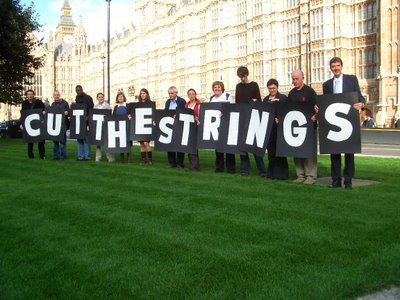
The figures are in from around the world and it looks like 23, 542, 614 people took action as part of the Stand Up Against Poverty world record attempt this weekend. The picture above is from this morning's action in Trafalgar Square announcing the total - more from around the world at WhiteBand.org.
With a reported 20 million people taking part in the Philippines alone, however, there are already calls coming in for a recount...
Tuesday, October 17, 2006
Millions stand up!
Monday, October 16, 2006
Engaging with Hilary
 In the meeting with Hilary Benn at Portcullis House on Thursday, we managed to speak with him for nearly an hour on conditionality attached to debt relief.
In the meeting with Hilary Benn at Portcullis House on Thursday, we managed to speak with him for nearly an hour on conditionality attached to debt relief.
Boardroom style, with Mr. Benn and his cohorts at the end of the table and the fourteen of us surrounding him, the format was actually fairly informal. We started off with a bang, asking him straightaway what specifically he would require to release the £50 million worth of funding to the World Bank. Although he avoided the issue, just as most politicians, he said he would know once he gets the report from the World Bank.
What would he like to see in the report? The truth.
What will he do when he gets the report, will he release the money or will he hold back more? He will decide that once he gets the report, ‘you can’t put the cart before the horse’ type of answer.
How will he make his judgement, what specifically will make him happy? If the World Bank is moving in the right direction, that is progress. It does not happen all at once.
Typical politician though he is, Hilary Benn is a great speaker, particularly good at dancing around the issues. But accolades to  him for even agreeing to speak with us. He is very passionate when he speaks, and he does genuinely seem to care about the issues. Holding back the £50 million – despite being such a relatively small amount – is a great start. If the amount wasn’t enough, his timing was impeccable, sending a message to the World Bank to get their act together, if nothing else. Now we just need to make sure he follows through with that message in November when he gets the World Bank report, and February/March when discussions about the next round of World Bank funding begin.
him for even agreeing to speak with us. He is very passionate when he speaks, and he does genuinely seem to care about the issues. Holding back the £50 million – despite being such a relatively small amount – is a great start. If the amount wasn’t enough, his timing was impeccable, sending a message to the World Bank to get their act together, if nothing else. Now we just need to make sure he follows through with that message in November when he gets the World Bank report, and February/March when discussions about the next round of World Bank funding begin.
Hilary is still farther away then we’d like him to be on issues of debt relief and conditionality…but he is a lot closer than many other politicians – just ask him yourself, he will tell you. Several times he called for our help to garner support from other countries so that he will not be alone in the debate. To an extent, he is right. The UK is very progressive – compared to most countries, that is. We did remind him of good ole Norway who has taken the great leap of cancelling debt which they have taken responsibility for, calling it irresponsible lending on their part. He seemed unaware of this action, but perhaps his ill preparedness will cause him to consider it further…we can hope.
Despite his seemingly good intentions – there are still issues that many of us would argue with him. For instance, his insistence that HIPC conditions cannot be revisited. There is also still quite a grey area, where he considers conditions to be either good or bad. For him it is not an issue of whether or not we have conditions, but "which conditions". Some of what he considers to be good conditions, however, is rather alarming. At one point he was ranting about how inflation hurts the very poor, implying that the regulation of inflation is not a "bad" condition. First off, the correlation between low inflation and a robust economy does not exist! Many economists disagree on the issue, and there is no generally accepted proof on the effect of inflation. Secondly, imposing conditions from the top is not the way to strengthen and encourage democracy. In the past, these macroeconomic conditions have shown how they can be more detrimental than beneficial to host-countries (e.g. IMF policies and East Asian financial crisis of 1990s).
We still disagree on many issues, especially when it comes to "good" versus "bad" conditions. Mr. Benn often referred to his favourite bad conditions – trade liberalisation and privatisation. Clearly, he needs more convincing, if that is where is train of thought ends. At least we know he is listening. Even when he avoided questions, gave a vague answer, or went off on a tangent (most notably why WDM is awful), he was engaging with us. Fortunately, there were many great questions posed towards Hilary Benn, as well as some excellent responses to his mini-speeches – so this meeting was not meaningless. A couple of times he even seemed genuinely stumped.
Overall, I think we gave the impression of a well-informed group who obviously cares about poverty alleviation and cutting the strings. Most importantly, Hilary Benn knows the numbers of supporters there are, and that we are not going anywhere. We will be watching as he makes his decisions, and we will hold him accountable.
Tuesday, October 10, 2006
Global warming - global debt
As part of the GCAP Month of Action, I have anumber of speaking engagements on climate change. But how does this relate to debt relief? In brief...
The scientific evidence is now overwhelming - climate change will overwhelm the entire globe, bringing unimaginable calamity on our own children or grandchildren, unless vigorous action is taken as a matter of urgency. "Never before have we faced such a global threat… The longer we procrastinate, the more difficult the task becomes" (Lord Robert May, President of the Royal Society).
But the world's poor will suffer first and most – "The impacts of climate change will fall disproportionately upon developing countries and the poor… within all countries" (Intergovernmental Panel on Climate Change). Indeed, there is strong evidence (from climate labs of the highest standing) that they are already suffering severely from the effects of our polluting life style - "Climate change, largely caused by greenhouse gas emissions, may already be responsible for… a drop in rainfall since 1996 in Ethiopia and surrounding..." (Lord Robert May).
So does this mean, debt relief and trade justice are no longer as important as once we considered them to be? NO, A THOUSAND TIMES NO! Indebted poor countries are going to need all the help they can get to weather the storms now metaphorically and literally brewing on their horizons. Climate change simply adds one more reason why we have an obligation to stop pussyfooting around and 'Drop the Debt!'

